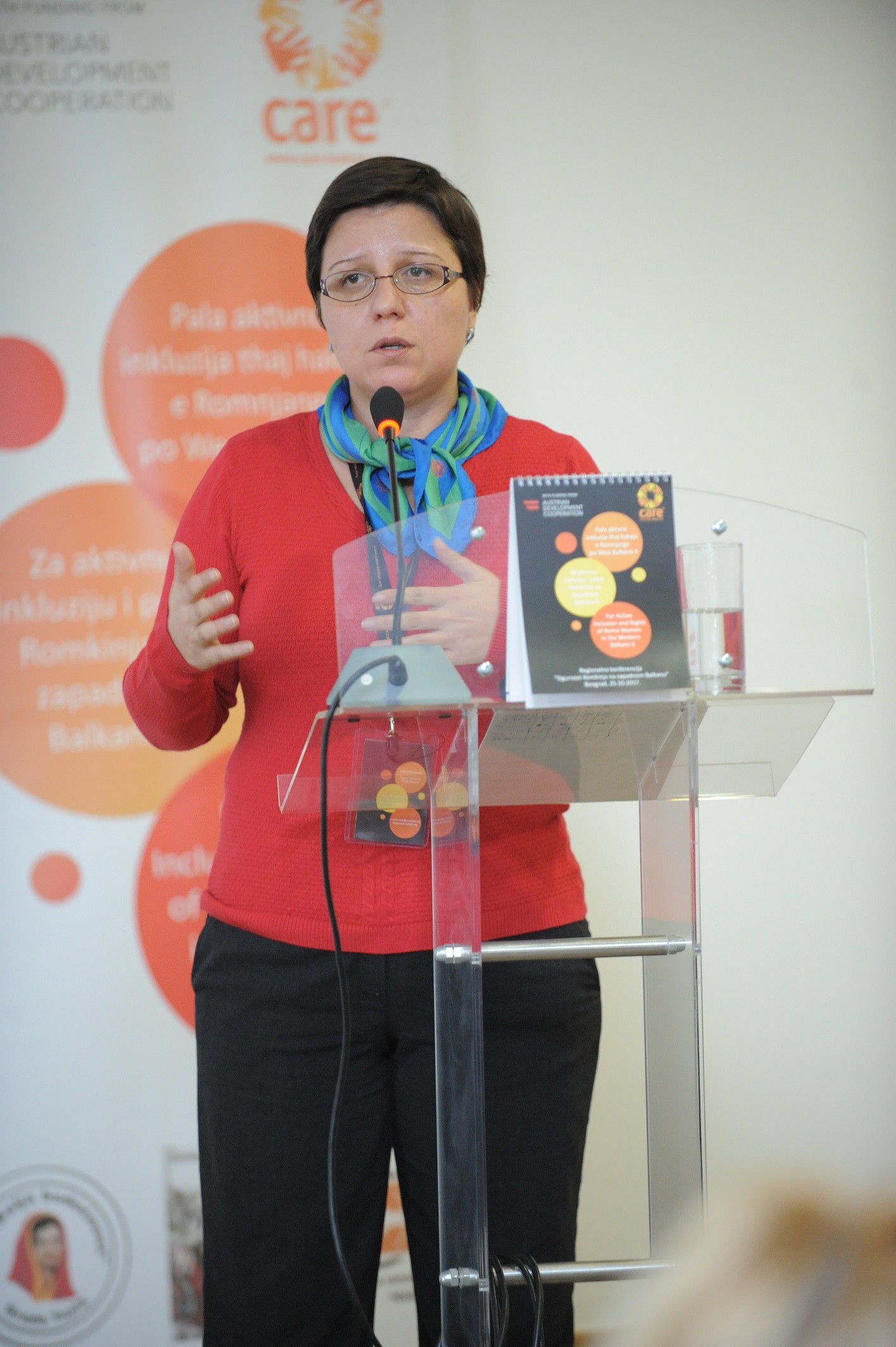Key Note at the Regional Conference "Security of Romani Women in the Western Balkans"
- 25 Oct 2017
- News

photo: Care International
Ms Aleksandra Bojadjieva, Policy Expert of the Regional Cooperation Council’s Roma Integration 2020 Action Team, participated at the regional conference “Security of Romani Women in the Western Balkans” organized by Care International in Belgrade on 25 October 2017.
The topic of security of Romani women has been identified as the organizers, through their multi-year engagement in the region, observed that regardless of the adopted legislation and ratification of relevant international treaties, particularly the 1325 Resolution “Women, Peace, Security and Safety”, Romani women remain multiply discriminated in the Western Balkans region. The conference intended to bring together representatives of governmental institutions, civil society and international organizations. The aim of the conference was to ensure adequate policies and programmes ensuring safe life of Romani women in regards to education, reproductive health and sex-based violence, at the same time ensuring access to direct support and help, within the existing Roma integration action plans of Bosnia and Herzegovina, Montenegro and Serbia.
Participants were invited to present the situation in their respective economies on the conference topic, identify the causes for such situation and propose solutions, present good and bad practices and exchange experiences, and jointly draft conclusions and recommendations for improvement of the situation regarding the security of Romani women in the Western Balkans. Another expectations of the conference was to improve the quality of the cooperation among civil society organizations of Romani women and with the relevant government institutions for ensuring better security of Romani women.
Ms Bojadjieva was invited to give a key note speech at the conference, focusing on the opportunities provided with the official Roma integration policies for socio-economic security of Romani women. After providing a general overview of the causes and manifestations of the specific multilayer vulnerability of Romani women, Ms Bojadjieva also provided an overview of some of the available data indicating the disproportionately adverse socio-economic situation of Romani women in the region. The Action Plans for Roma integration in the region were analysed from the aspect of dealing with the issue of Romani women. Ms Bojadjieva noted that the Action Plans contain a handful of measures that may be beneficial for Romani women, provided that deliberate effort to this end is made. Such measures can be found in the Action Plans as mainstream measures and public services intended to all the people, specific measures and services designed for Roma, as well as specific measures and services designed for Romani women. Ms Bojadjieva suggested that the participants of the conference may review in detail the relevant Action Plans to identify those measures and services that may be beneficial for the security of Romani women and advocate for intentional outreach to Romani women with those measures and services, to work seriously on advocating for and collecting data that may be disaggregated by ethnicity, sex and age, and to put extra efforts in their community work aiming at building the capacities of Romani women to defend themselves and claim their rights.
The participants of the conference agreed on a number of conclusions and recommendations directed to different stakeholders in the society relevant for the issue of security of Romani women, including:
• To the Roma community, civil society and Romani women activists:
o Intensify the community work, particularly on mobilizing Romani women and building capacities for activism
o Intensify the cooperation with the relevant institutions
o Work on increasing the sense of solidarity, particularly among Romani women
o Open intra-community dialogue on a number of negative phenomena seen as traditions, such as early marriages, domestic violence, etc.
o Spread out information on the rights and protective mechanisms related to collective and individual security
o Work on building defence culture among Romani women
o Network as far as possible (locally, nationally, regionally and Europe-wide)
o Analyse existing Roma integration and mainstream policies to identify plans that may be beneficial for Romani women and advocate for their outreach to Romani women
o Prioritize employment of Romani women at civil society organizations and advocate for their employment at institutions and international organizations
o Work on increasing the mutual trust between Romani women and institutions
• To the responsible institutions in the region:
o Establish expert consultative inter-disciplinary committees, with strong participation of Romani women, to contribute to the relevant policies and decision making
o Ensure consistent implementation of the adopted strategies and action plans for Roma integration, as well as legislation on gender equality, particularly requirements for participation and representations at various bodies and institutions
o Establish coherent mechanisms for monitoring results and impact of the official Roma integration policies with possibility to disaggregate data by ethnicity, sex and age
o Establish transparent mechanisms for budgeting of Roma integration and mainstream policies and ensure budgeting responsive to the needs of Roma and Romani women
o Ensure outreach to Romani women with the measures and services established with mainstream, Roma integration and Romani women specific policies
o If specific policies targeting Romani women (as part of the Roma integration policies or separate) don’t exist, initiate a process for developing such policies
o Prioritize the employment of Romani women in the public sector
o Increase the capacities and knowledge of relevant institutions (police, social centres, courts, equality bodies, etc.) to work on Romani women issues, including by employing Romani women as regular staff and/or mediators
o Increase the financial support to the civil society for community work
• To the European Union (EU) institutions:
o Ensure official follow-up after 2020 of the EU policy on Roma integration, the EU Framework for National Roma Integration Strategies up to 2020, at EU level, strengthening the EU commitment, ensuring better mainstreaming of Romani women and increasing the role of the enlargement region
o Recognize the phenomenon of Anti-Gypsyism at EU level and ensure proper legislation to combat this phenomenon at the level of EU and nationally, including within the enlargement region using the EU integration process
The Roma Integration 2020 Action Team is considering the proposal for organizing a regional conference on the rights of Romani women and children within the official Roma integration policies across the region.






